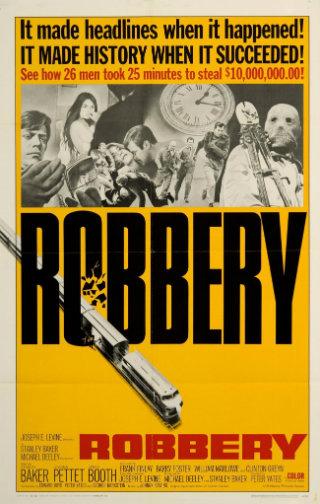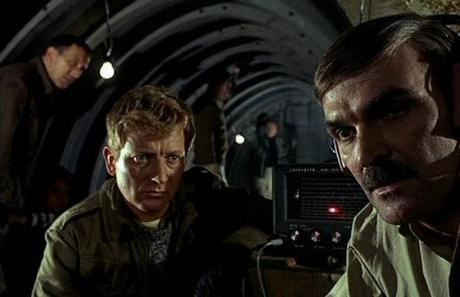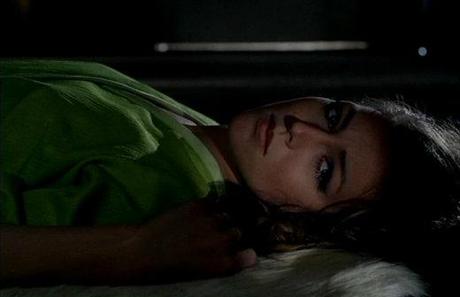
Films centered around heists generally fall into two categories – those which take a light-hearted, comedic approach such as Ocean’s Eleven, The Italian Job or Gambit, and the darker morality tales to be found in film noir like The Asphalt Jungle, The Killing and others. Peter Yates’ Robbery (1967) takes an entirely different tack, and tells its tale in a semi-documentary style. The movie is inspired by (and I use that term deliberately rather than saying it’s based on real events) the Great Train Robbery of 1963. Yates’ film uses the famous crime as a template but it shouldn’t be seen as an exact reconstruction of what happened. The style of storytelling used is probably the strength of the production, but I think it’s fair to say that it also accounts for its main weakness.
The bulk of the running time concentrates on the planning and execution of the raid on the mail train, and merely touches on its aftermath right at the end. The first quarter-hour sets the exciting yet impersonal tone of what is to follow by detailing a daring diamond snatch in central London. The purpose is to secure sufficient funds to set everything in motion, and it’s a terrific piece of filmmaking. The highlight is the intensely shot car chase that takes place after the diamonds have been grabbed. The whole idea of a car chase is one that has been used, and arguably overused to the point of cliché, in countless thrillers over the years. There are, however, instances where this standard element has been shot and employed to great effect, and Robbery is certainly one of those. After this heart-pounding sequence, the pace relaxes somewhat as we watch Paul Clifton (Stanley Baker), a recently released convict, begin to piece together the team of underworld types he needs to pull off the one big score that will allow him to bow out and retire. However, such things never run entirely to plan and little obstacles and issues arise right from the beginning. Taken in isolation, none of these flaws or setbacks amount to much in themselves; however, the cumulative effect as the story develops is what ultimately counts. While we’re afforded glimpses into the lives of all the principals involved, most of the action plays out from the perspective of Clifton and the policeman, Langdon (James Booth), who is on his trail from early on. The robbery itself is carried out in the style of a military operation, with everyone having their roles clearly defined and the timing judged to the second. As viewers, we’re just as aware as the protagonists of the importance of all the details falling into place and the risks inherent in any deviation from the plan. This knowledge, and the script’s focus on it, is what creates the tension on which the story relies. Nevertheless, despite the most meticulous preparation, such things inevitably start to unravel. As I mentioned before, there are numerous weaknesses in the plan that build up and become magnified over the course of the movie, and it’s impossible to identify any one as the most critical. I found the ending of the film quite satisfactory – it has the kind of moral ambiguity that both fits the era in which it was made and also acts as a truer reflection of real life.

I guess Peter Yates really made his name as a director when he took charge of Bullitt. That film featured an iconic car chase sequence through San Francisco, and it appears that his work directing the opening chase in Robbery played an important part in securing his participation in the McQueen movie. In terms of visuals and pacing, it’s hard to fault Yates – the film has a gritty and realistic feel and moves smoothly along. The main set piece, the actually taking of the mail train, is superbly filmed and cut together to heighten the sense of urgency of the gang. The same can also be said of the subsequent sorting and dividing up of the takings in the bunkers below a disused air force base; the claustrophobic set is used to good effect to emphasize the isolation of the gang and their distance, emotionally at least, from the dragnet that has been cast. Generally, the film does a good job of capturing the flavor of that late 60s era, not the swinging, carefree one which seems to be the popular perception now, but the grim and tough one that was familiar to most working-class people. I said in the introduction that one of the picture’s strengths, perhaps its greatest, was the brisk, documentary tone which simultaneously, and paradoxically, weakens it too. The point is that by concentrating on the nuts and bolts aspects of the robbery a lot of the human drama is absent. We don’t really learn a great deal about the characters involved, aside from their role within the gang, and this means we never get the opportunity to feel strongly for them. I don’t think this is a failing of Yates really as some of his subsequent work, especially The Friends of Eddie Coyle, is basically character driven.
Robbery features a strong line up of British actors, although the focus is mainly on Stanley Baker and James Booth (both of whom, coincidentally, starred in producer Joseph E Levine’s earlier movie Zulu) and they dominate proceedings. Booth is pretty good as the man from the Flying Squad who cottons on to what may be happening before anyone else. Having said that though, the script allows for no sense of who this man is beyond his job – he’s just a cop, albeit a likeable one. Baker does get a little more back story to help flesh out his character, but again this is strictly limited. Baker was a fine actor, one of the best Britain produced, yet he’s handed a fairly one-dimensional part here. We do learn that he’s desperate to avoid a return to prison, and the scenes between him and his wife (a very attractive Joanna Pettet) give at least a glimpse of the private man. Still, by and large, Baker spends most of his time playing it strong, silent and tough. I guess the most rounded character is to be found among the supporting players – Frank Finlay is excellent as the timid banker, an embezzler who finds himself drawn into Baker’s scheme. Finlay gives a very sensitive portrayal of a man torn by personal guilt and his longing to contact his wife, even for the briefest moment, is quite touching. Barry Foster is underused as one of the senior gang members, although William Marlowe gets a slightly meatier part as Baker’s right hand man.

A few years ago, Robbery was released on DVD in the UK by Optimum. Despite its faults, it’s a movie I’ve always liked a lot and so I was keen to pick it up. However, I was disappointed to find that Optimum’s disc had a full frame, open-matte presentation of the film. Anyway, I had to make do with that compromised edition since there didn’t appear to be any other option available. Recently though, I noticed that Regia Films in Spain had put out a disc, and I decided to take a chance and see if it was any improvement. I was pleasantly surprised to find an excellent transfer of the film that presented it in the 1.66:1 ratio with anamorphic enhancement. The disc has no extra features whatsoever, but the subtitles don’t cause any problems and can be switched off from the setup menu. The fact that the movie is now available in anamorphic widescreen is the most important advance as far as I’m concerned. I don’t think the film is a perfect one, but it does have a fine cast and shows off Yates’ flair for action and tense situations. Despite its flaws, I’d still recommend this title to anyone keen on British crime pictures, or just crime movies in general.
